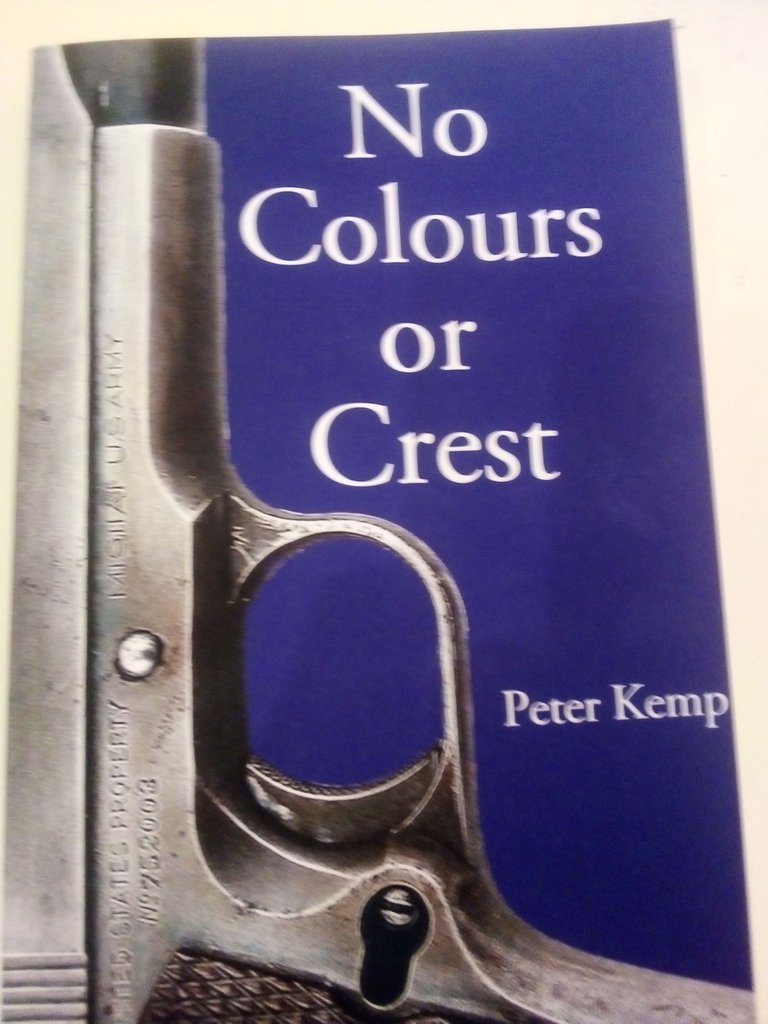
Hello Hivers and Book Clubbers,
Time for another review. I grabbed one from my 'non-read' shelf, which numbers over 30 books (oops, but working on it), of which I have read the first installment about a year ago.
This second installment is called 'No Colours or Crest'. It was originally published in 1958, but without much traction then it has fallen by the wayside for decades. Mystery Grove Publishing has re-released the text a couple of years ago, to have younger generations be able to enjoy it too without having to pay an absurd amount for one of the few original copies left.
Back to England
In the first book, Kemp wrote about his first military adventure; as a student he had joined up with the Nationalists in the Spanish Civil War (1936-1939). Very few Englishmen joined Franco; most could be found among the Republicans/communists (romanticized by Hemingway, among others).
Kemp made his way back home in 1939, where his home country would soon find itself at war with Germany. He joined the English military, but his pretty peculiar previous military experience had received interest to follow a specific path; he ended up with what would quickly become the SOE, the Special Operations Executive.
The Spanish and Norwegian duds and Commando Raiding in France
After months of training and setting up the squad, the first plan was for Kemp to take part in operations in Norway involving mostly sabotage. Germany got a lot of their iron from both Sweden and Norway, so hitting this supply chain made sense from a strategical point of view. But the North Sea wasn't safe travelling at the time; the submarine Kemp was travelling in got hit by a mine. By a small miracle, the damaged submarine was able to make it back to Scotland. Before the attempt could be made again, the Germans had conquered Norway, and the operation was called off.
His next posting would be Gibraltar. The British expected that Franco could join the war on the side of the Axis. Thus, the mission was to set up resistance in Spain itself. This expectation proved to be wrong; Franco's Spain remained neutral throughout the war. Kemp and the men of his unit were stuck on the Rock for months without any action whatsoever.
After these somewhat uneventful episodes, a different avenue opened up from England itself; it was decided that Kemp's unit would make small-scale raids on the French coast, currently (1942) held by the Germans. This was done to force the Germans to send more troops there, to acquire information by taking prisoners, and to demoralize the enemy.
The results were varied; one raid was a complete success, with prisoners and all. In another, while Kemp was out of action due to an injury, about two-thirds of a raiding party was either killed or captured themselves. In a third, in which Kemp was the commanding officer, there was a half-success; four confirmed kills and no losses, but no prisoners or acquired intel. Then they were forced to shut down; resources in the Channel all went towards the early planning of D-Day.
Albania
The next posting for Kemp was one that was completely alien to him: Albania. Albania had ended up under Italian influence even before WWII, when king Zog was deposed by Mussolini. Kemp was parachuted in to acquire intel on the political situation there, and to organize any resistance possible to both the Italians, and after they were out, the Germans there.
The political situation in Albania at the time was a complete mess at the time, which Kemp was slowly to grasp. To explain it in detail in this review would be overdoing it as well; my own mastery of the situation, even though I read the book, is still quite lacking. But let it be said that communism, under the leadership of Enver Hoxha (who would later become president) was on the rise, even during the Italian occupation.
Albanian groups spent as much time fighting each other as they did the Axis. During the book, one can feel Kemp's frustration mount at the people's lack of focus in this regard. Corruption and theft were common also, and the Albanians, partly because of a lack of training, were very undisciplined fighters too. At multiple times, they ran away from fights where they outnumbered the enemy more than 5 to 1. In the end, communism would take over Albania, leaving Kemp's role in it quite ambiguous: the man who volunteered to fight communism for three years in Spain did his small part in establishing it in the Balkans.
Conclusion
From there, Kemp ended up in Poland, but I leave that story for now to encourage the reader to pick up this book series. Small-time indie publishers like Mystery Grove deserve all the credit for bringing these out-of-print memoirs back to life. Kemp's stories offer unique views of World War II. I mean, who thinks of Albania in this whole story? I haven't, until now. The three books are readily available on websites like Amazon, for those that are interested. I hope you enjoyed reading, and will see you all in the next review. Until then,
-Pieter Nijmeijer
(Top image: self-made photo of book cover)
The main character kemp seems to have been in a lot of war, as a soldier he pretty much outstanding to be posted around like that, his journey for me is kinda scary seeing comrades die in battle countless times, that's not a pretty site.